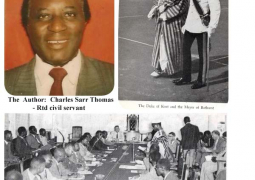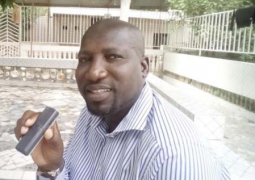The Minister of Higher Education Research, Science and Technology, Professor Dr Abubacarr Senghore, has commended the director general of West
Africa Health Organization (WAHO) Dr Xavier Crespin, for giving The Gambia the opportunity co-host the WAHO 7th Annual Congress together with
WAHO “to build upon what we have achieved in the past two years”.
He commended the WAHO DG on behalf of President Yahya Jammeh and the Gambia Ministry of Health and Social Welfare.
The aim of the congress was to keep up with the objective of WAHO to support the ECOWAS Member States to promote dialogue between the
practitioners of traditional medicine and conventional medicine.
The minister made this statement at the recently concluded 7th scientific congress of Traditional Medicine Practitioners (TMPS) and conventional medicine
practitioner in Banjul.
The congress, which brought participants from various countries in the sub-region, was fully funded by WAHO, in collaboration with other development partners.
The minister said that in some communities in ECOWAS countries traditional medicine has been a crucial part of healing for hundreds of years.
“In some African countries, 80% of the population depends on traditional medicine for primary health care,” he said, adding that the provision of safe and
effective traditional medicine could be a critical tool for increasing overall access to health care.
Herbal medicine remains the first line of treatment for 60% of children with malaria-induced high fever in some ECOWAS countries, he said, justifying the
theme on the current level of Traditional Medicine Development in ECOWAS.
The higher education minister also said it has been recognized that traditional medicine has a long history in African communities with wide impact.
It is still an important component of modern health care system, playing a significant and indispensable role in many countries, he said.
The reason for adopting the theme is the fact that the development of African traditional, complementary and alternative medicines calls for promotion of its
practitioners as well as improvement of the quality of their products for healthy use.
“In doing so we must tackle head-on issues regarding lack of harmonization of policies, regulation and technical guidelines to ensure safety, efficacy, quality
and benefits of traditional medicines marketed in Africa,” the minister said.
He added: “Our aim therefore as a country is to successfully incorporate traditional medicine into the national health system with a view to sharing best practices and processes with other African member states.”
In addressing these challenges, a multi-disciplinary approach is needed, he continued, saying that in addition to strengthening national capacities and relevant legislation, there is need for concerted action and cooperation by governments, key stakeholders and health professionals, to ensure proper use of traditional medicine as an important component contributing to the health of people.
The higher education minister challenged the participants to adequately address the key issues, which constitute the sub-themes of the congress, thus promoting traditional medicine.
Improving documentation of traditional medicine practices can be achieved through ethically sound, culturally-sensitive TM research for future prospects of traditional medicine in the ECOWAS region.
It can take also a conceptual approach and strategic collaboration between practitioners of traditional medicine and conventional medicine.
Minister Senghore added that the provision of safe and effective traditional medicine could be a critical tool for increasing overall access to health care.



